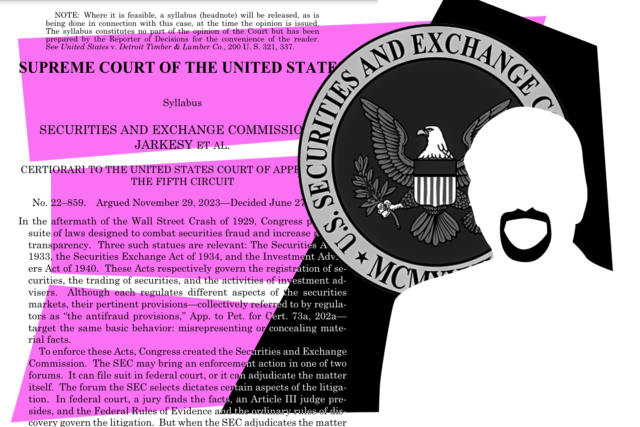On Thursday, the Supreme Court gutted the ability of government agencies to enforce regulations against those who break the law. While the case, SEC v. Jarkesy, might sound dry, the decision is a big deal: It allows wrongdoers targeted by the Securities and Exchange Commission—as well as a bunch of other federal agencies—to demand a trial by jury in federal court, upending the usual adjudication process before administrative law judges. The federal government does not have anywhere close to enough resources and personnel to take every case to a jury when it seeks to impose civil penalties. So the decision will chill enforcement throughout the executive branch, allowing more white-collar criminals, polluters, abusive employers, and other malefactors to slip through the cracks. And it all started with a little-known hedge fund manager from Texas named George Jarkesy—a Republican activist and conservative radio host bankrolled by billionaires like Elon Musk and Mark Cuban.
So who is the man whose case may have just kneecapped the executive branch in a decision that Justice Sonia Sotomayor bluntly characterized as “a power grab” by the judiciary?
Jarkesy managed the Houston-based hedge fund Patriot 28. He hosts a conservative radio show on which he has railed against government agencies like the Department of Energy and the Department of Education. He also once argued that the Civil War was started because the North ran out of money. “They had taxed their people into oblivion. They had ran over their budgets, they were broke, and the South had money,” said Jarkesy. He was also no fan of former President Barack Obama, referring to him as “comrade Obama” and even writing a song called “The Bad Obama Blues,” where Jarkesy called him a liar and said, “the president spends like a maniac.”
More than a decade ago, the SEC fined Jarkesy for misleading investors. The agency alleged that Jarkesy’s fund “arbitrarily” inflated the value of certain holdings from 30 cents per share to $3.30 per share—“so that they could charge higher management fees.”
During a 12-day hearing at the SEC’s offices in 2014, Jarkesy said “I don’t recall” or some version of it more than 800 times. An administrative law judge determined Jarkesy had committed securities fraud through his two hedge funds, which managed a cumulative $24 million in assets. According to the judge, he and his firm lied to their 120 investors about how their money was managed and did, beyond a doubt, overvalue holdings to justify extortionist management fees. The agency fined Jarkesy $300,000, banned him from participation in the securities industry, and directed him to give up nearly $685,000 in unlawful gains.
Jarkey refused to accept this outcome. The hedge fund manager filed a petition for review in the U.S. Court of Appeals for the 5th Circuit—a bench stacked with particularly unhinged Trump-appointed judges—which ruled the SEC had overstepped its power and violated the Constitution. The Biden administration stepped in to appeal the 5th Circuit’s ruling to the Supreme Court.
As Jarkesy fought his case against the SEC, billionaires Elon Musk and Mark Cuban bankrolled his legal fees. Musk had also tried and failed to challenge the SEC himself after he got in trouble with the agency in 2018. The SEC went after Musk for posting a series of tweets about his intentions to take Tesla private, which never ended up happening. As part of a settlement with the SEC, Musk agreed that a company lawyer would review all of his Tesla-related social media posts—but he later appealed to the Supreme Court, arguing that this was a violation of his First Amendment rights. The high court turned down the appeal.
Cuban joined Musk in filing a brief in support of Jarkesy’s case. They argued that SEC practices create an unfair advantage for the government and that by not allowing juries to hear civil cases, the SEC is harming “the very investors and markets the SEC is charged with protecting.”
In Thursday’s 6–3 decision, conservative justices vindicated the 5th Circuit, Cuban, and Musk. In Chief Justice John Roberts’ majority opinion, the Supreme Court ruled in favor of Jarkesy and established a troubling new precedent: Any time a government agency wants to impose civil penalties, the defendant has a Seventh Amendment right to demand a jury trial in federal court. As Sotomayor’s dissent demonstrated, this holding has no basis in the Seventh Amendment, but flows entirely from the majority’s sympathy toward powerful rulebreakers who want to spend their way out of accountability.
The majority’s holding blows up decades of precedent allowing agencies to try these cases “in-house” before government-appointed experts whose independence and expertise brought consistency and fairness to the proceedings. And the sweeping decision could have repercussions beyond just the SEC: It opens the door to other legal challenges that could limit the power of the Federal Communications Commission, Federal Trade Commission, the Department of Labor, the National Labor Relations Board, and more. The ruling is a huge victory for union-busting employers, polluters, billionaires, corporations, and other frequent targets of agency enforcement. Defendants can now insist on a jury trial before a federal judge, drawing out the proceeding by a matter of years and exploiting the government’s comparative lack of resources. Agencies now have a strong incentive to simply decline enforcement rather than slog through the judiciary.
Thursday’s decision, in other words, is a big win for crooks like Jarkesy, and for billionaires and their friends in the conservative legal movement—and a loss for anyone who believes the government has an important role to play in protecting the public.
This is part of Opinionpalooza, Slate’s coverage of the major decisions from the Supreme Court this June. Alongside Amicus, we kicked things off this year by explaining How Originalism Ate the Law. The best way to support our work is by joining Slate Plus. (If you are already a member, consider a donation or merch!)




